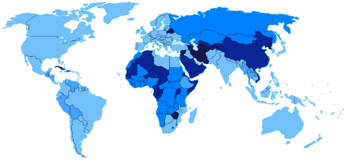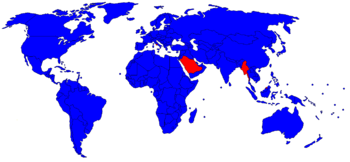Democracy

Democracy means rule by the people.[1] The name is used for different forms of government, where the people can take part in the decisions that affect the way their community is run. In modern times, there are different ways this can be done:
- The people meet to decide about new laws, and changes to existing ones. This is usually called direct democracy. It can never used except in small countries, or perhaps in towns. Modern populations are usually too large to do this.
- The people elect their leaders. These leaders take decisions about laws. This is commonly called representative democracy. The process of choosing is called election.[2] Elections are either held periodically, or when an officeholder dies.
- Sometimes people can propose new laws or changes to existing laws. Usually, this is done using a referendum, a vote.
- Sometimes, the people who make the decisions are chosen more or less at random. This is common, for example when choosing a jury for a trial. In Europe, trials with a jury are only used for serious crimes, such as murder, hostage-taking or arson.
The type of government where power is in the hands of a single person is called a dictatorship. Democracy is the opposite of a dictatorship. The Soviet Union almost always was a dictatorship, as Russia is today. Dictatorships usually act against freedom of expression.
Types of government[edit]
Elections are simple: The candidate with the most votes gets elected. Very often, the politicians being elected belongs to a political party. Instead of choosing a person, people vote for a party. The party with the most votes then picks the candidates.
Usually, the people being elected need to meet certain conditions: They need to have a certain age or a government body needs to determine that they are suitably qualified to perform the job.
Not everyone can vote in an election. Suffrage is only given to people who are citizens. The young are usually excluded, and some other groups such as prisoners.
For some elections, a country may make voting compulsory. Someone who does not vote, and who does not give a good reason usually has to pay a fine




Kinds of democracy[edit]
Democracy may be direct or indirect.
In a direct democracy, everyone has the right to make laws together. One modern example of direct democracy is a referendum, which is the name for the kind of way to pass a law where everyone in the community votes on it. Direct democracies are not usually used to run countries. It is not practical to have everyone voting on everything..
In an indirect, or representative democracy, people choose representatives to make laws for them. These people can be mayors, councilmen, members of Parliament, or other government officials. This is the usual kind of democracy. Large communities like cities and countries use this method, but it may not be needed for a small group.
History[edit]
Ancient origins[edit]
Democracy was developed long ago by the ancient Greeks in classical Athens. There, everyone who was a citizen (not slaves, women, foreigners, and children) got together in one area. The assembly would talk about what kinds of laws they wanted and voted on them. The Council would suggest the laws. All citizens were allowed in the assembly.
The Council were picked by draws (lottery). The participants in the Council would change every year and the number of people in the Council was at the most 500. For some offices the Athenian citizens would pick a leader by writing the name of their favorite candidate on a piece of stone or wood. The person with the most votes became the leader.
Middle Ages[edit]
In the Middle Ages, there were many systems, although only a few people could join in at this time. The Parliament of England began from the Magna Carta, a document which said that the King's power was limited, and protected certain rights of the people. The first elected parliament was De Montfort's Parliament in England in 1265.
However, only a few people could actually join in. Parliament was chosen by only a few percent of the people (in 1780, fewer than 3% of people joined in).[4] The ruler also had the power to call parliaments. After a long time, the power of Parliament began to grow. After the Glorious Revolution in 1688, the English Bill of Rights 1689 made Parliament more powerful.[4] In modern democratic states, rulers may look after the process of election, and make sure it is legal and fair.[5]
Democratic consolidation[edit]
Democratic consolidation is the process by which a new democracy matures. Once mature, it is unlikely to revert to dictatorship rule without an external shock.
The idea is that unconsolidated democracies suffer from intermittent elections which are not free and fair. In other words, powerful groups are able to prevent the system working fairly.[6]
See also[edit]
- Majority rule
- Direct democracy
- Political party
- Constitution
- Constitutional economics
- Political economy
- Election
- Rule of law
- Citizenship
- Activism
- Politics
References[edit]
- ↑ "BBC - h2g2 - Demokratia - the Athenian Democracy". bbc.co.uk. Retrieved 13 July 2010.
- ↑ "Democracy Conference". Innertemple.org.uk. Retrieved 2010-08-22.
- ↑ Freedom in the World 2016, Freedom House. Retrieved 28 January 2016.
- ↑ 4.0 4.1 "Exhibitions & Learning online | Citizenship | Struggle for democracy". The National Archives. Retrieved 2010-08-22.
- ↑ "Exhibitions & Learning online | Citizenship | Rise of Parliament". The National Archives. Retrieved 2010-08-22.
- ↑ O'Donnell 1996 'Illusions about consolidation'
